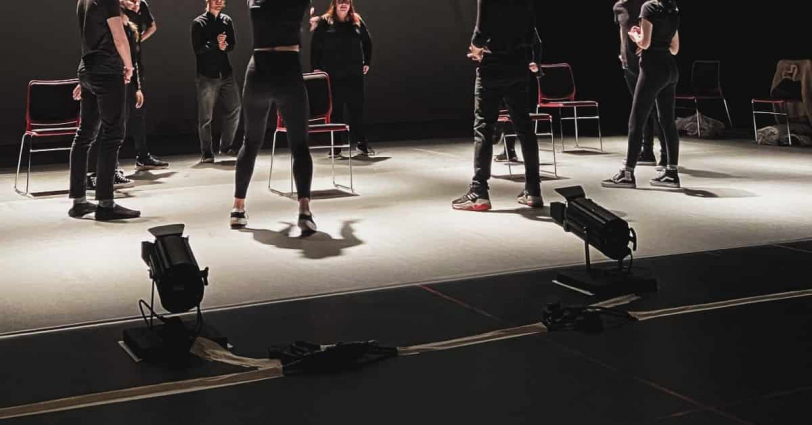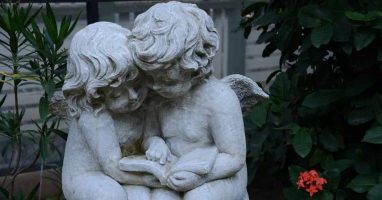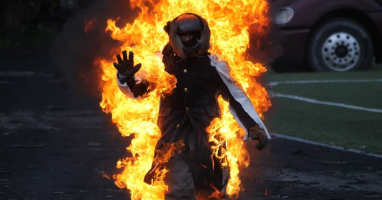I wrote this article in Japanese and translated it into English using ChatGPT. I also used ChatGPT to create the English article title. I did my best to correct any translation mistakes, but please let me know if you find any errors. By the way, I did not use ChatGPT when writing the Japanese article. The entire article was written from scratch by me, Saikawa Goto.
Introduction
Movies and books covered in this article
I will write an article about this movie/book
What I want to convey in this article
There were many scenes where “words stood out,” and I was overwhelmed by the power of language multiple times.



This work was created with many constraints by students, that’s why it made me appreciate the power of words even more.
Three takeaways from this article
- The powerful impact of the recitation of the poem “Violence and Choice” and reading a love letter aloud.
- The scene where a couple talks on a bridge before dawn and the depiction of “missing each other” in a scene suggesting the reason for their breakup is remarkable.
- The story of “courage” told about the coming-of-age ritual of an uncivilized tribe was very impressive.



At first, I was worried if it was an interesting piece, but for four hours leading to a beautiful ending, I enjoyed it.
Self-introduction article


Please refer to the self-introduction article above to learn about the person writing this article. Be sure to check out the Kindle book linked below as well.


Published Kindle books(Free on Kindle Unlimited)
“The genius Einstein: An easy-to-understand book about interesting science advances that is not too simple based on his life and discoveries: Theory of Relativity, Cosmology and Quantum Theory”
“Why is “lack of imagination” called “communication skills”?: Japanese-specific”negative” communication”
The quotes used in this article are based on notes taken at the movie theater from movies in Japanese and are not direct quotes from the foreign language original movies, even if they exist.
I was Constantly Surprised by How the Impact of “Words” was Stronger than that of “Visuals” in This Movie
Before delving into the content, I would like to first touch upon the process that led me to watch this movie.


First, I watched “Drive My Car,” which I had decided never to watch. Please read the following article to find out why I had decided not to watch it.


And then, I found out that it was also a work of the same film director, so I decided to go see “Wheel of Fortune and Fantasy”, which I had also decided I would never watch.


Both were absolutely amazing movies, and they were such masterpieces that I couldn’t believe such films could exist.
You watched “Drive My Car” at the end of 2021 and “Wheel of Fortune and Fantasy” at the beginning of 2022, didn’t you.



It was like, it ended with a great piece, and it started with a great piece.
Later, I was talking about movies with a friend, and she told me about a new movie theater called K2 in Shimokitazawa that was showing past works by director Hamaguchi Ryusuke. From there, I chose a film that I could watch based on my schedule, which led me to this movie called “Intimacies”.
Honestly, if something had been slightly different, I don’t think I would have had the opportunity to watch any of “Drive My Car”, “Wheel of Fortune and Fantasy”, or “Intimacies”, so meeting the works of director Hamaguchi Ryusuke was really impressive including the timing.


Now, before discussing the content, let me briefly explain the structure of this movie. The movie is an astonishing four hours long and is divided into two parts: the first part tells the story of a theater company preparing for their next production, while the second part features the entire performance of the play they prepared in the first half, making for a unique and innovative structure. Both the movie and the play are titled “Intimacies,” and the movie depicts the people preparing for the stage production of “Intimacies” within the movie, where the actual “Intimacies” play is performed.




Looking at just the way this movie is made, you could say it’s a very unconventional work.
In this Work, the “Words” Take Center Stage While the “Images” Feel Like They’re Just an Extra
In my articles about “Drive My Car” and “Wheel of Fortune and Fantasy,” I touched upon the lack of “movement” and “emotion” in Hamaguchi Ryusuke’s works. Expressions of movement and emotion by the actors should be very important elements that make up the “images” of a movie, but they are thoroughly suppressed in Hamaguchi Ryusuke’s works. Please read each article to see what effect this has.




In the movie “Intimacies,” the “movement” is not much different from a typical movie, but the “emotion” is somewhat restrained. However, it’s hard to tell if this is intentional or not. The movie was created as a graduation work for a specialized school called “ENBU Seminar,” and the actors are students from that school. To be honest, the actors are not necessarily skilled, and it’s difficult to judge if they are “not expressing their emotions” or “unable to express their emotions.”



Honestly, I feel the quality of the acting is not very directly related to the quality of the movie.
At the beginning of the movie, I was worried if it would be good, but in the end, I felt like I watched a really great movie.
In that sense, I didn’t get the impression that the movie “Intimacies” relied on “restraining movement and emotions” like I felt in “Drive My Car” and “Wheel of Fortune and Fantasy.”
I feel that what makes “Intimacies” work is the power of “words.”




In my review of “Wheel of Fortune and Fantasy,” I wrote that the script made the film work. However, with “Intimacies,” I felt that it’s not just the script, but the power of the words themselves that stand out. As someone who has already mentioned “Wheel of Fortune and Fantasy” and “Drive My Car,” I didn’t find the story of “Intimacies,” whether it’s the film or the play within the film, particularly remarkable. Nevertheless, the words in the movie are so prominent and compelling that they succeed in enhancing the quality of the film, even with constraints such as limited equipment, shooting location, actors, and budget that are unavoidable in a graduation project from a specialized school.
Therefore, in this article, I want to proceed in the form of taking up “scenes where words stand out” in movies and play within a play.


Recitation of the Poem “Violence and Choice”
Ryohei, one of the main characters in the movie “Intimacies,” is responsible for the script of the play within a play “Intimacies,” and also appears in the play within a play as a character named “Mamoru.” In the setting, Mamoru participates in a recitation meeting of self-composed poems, and one of the poems recited is “Violence and Choice.”
This poem resonated deeply with me. In the play within a play, a total of four poems are recited, but honestly, I don’t remember the others. Only “Violence and Choice” reached me with an overwhelming weight. For me, it might be the favorite scene in the entire movie “Intimacies”.







It may be a bit too logical to call it a poem, but I really liked it.
It’s out of step with the way the world feels, but the content is exquisite enough to make us think that it might indeed be true, come to think of it.
Mamoru recites this poem at a very fast pace, so I couldn’t remember or organize everything, but I’ll try to reproduce the content that I vaguely remember.


What is violence? It is “taking away someone’s choices or making them believe that there are no options.”
Even if someone is physically hurt or injured, if they still have choices, it may not be considered “violence”.
By defining violence in this way, we can also include non-physical violence.
This means that even if there is no physical pain, if there are no options, it can still be called “violence”.
Now, imagine someone facing a situation that they would like to call violence.
However, they still have choices. Even so, the person will claim that “they were subjected to violence”.
And in this case, isn’t the existence of someone who shouts “I was subjected to violence” even though they still have choices, the one who should be called “violence”?




Honestly, even though I wrote this, I feel frustrated that I can’t fully recreate the feeling of inspiration I got when I first heard it in the movie. The content touched on more many different stories and I deeply empathized with the logical conclusion that “we can’t choose only that we ‘can’t choose,'” but I don’t remember enough to reproduce it accurately.
I wonder who wrote this poem?



The script for the play within a play “Intimacies” was actually written by the actor Sato Ryo, who played the role of Ryohei. So maybe he also wrote this poem.
In the first place, both Ryohei and Mamoru have very little empathy for others and speak reasonably and persuasively to others, which I think matched the content of this poem about “Violence and Choice.” Mamoru’s “madness” of spitting out words at lightning speed can also be seen as somewhat “violent,” and I was also drawn to the strangeness of reciting a poem about “violence being the theft of choices” in that kind of tone.


The poem itself doesn’t necessarily link to the content of the movie or the play within a play, but it was a scene with a big impact that really hit me.
Reading Out a Love Letter that was Written in One Go over the Phone
In the play within a play, there is a scene where a woman reads the contents of a letter to her female friend over the phone. This scene was also very good. It was a situation where the “words” alone seemed to dominate and I was drawn into it.


The woman wrote a love letter to her brother’s roommate who works at a post office. She is good friends with the post office worker and has been open with him about various things. In reality, she has a tendency to have sex with anyone and has been called a “club crusher (a person who disrupts relationships within a small group from within)” at her university for her promiscuous behavior with members of the same club, causing it to fall apart. She has also shared this information with the post office worker. Although she truly likes him, she believes that simply expressing her feelings normally shouldn’t be enough to convey how she really feels.


Until now, they had a relationship where they would meet naturally because he was her brother’s roommate. She was satisfied with the current situation, but when the postal worker, who was her brother’s roommate, suddenly decided to move out, she sank into despair. She resolved to express her feelings properly and quickly wrote a love letter. However, lacking confidence in the contents, she had her best friend listen to it over the phone.
The contents of the letter were also very nice.







This letter had such an impact that it completely changed the impression of the woman in the play within a play.
You can feel the sincerity through her words, right?
I won’t get into the specifics of the content, but I was shaken by the desperate content of the message, “I think I understand how you see me, but I am serious about telling you how I feel about you, and everything I have said and done to you is a paraphrase of ‘I want you to love me'”.


A Scene Where a Screenwriter and a Director Talk on a Bridge
In the movie, one of the most visually beautiful scenes is the “conversation on the bridge.” Screenwriter Ryohei and director Reiko, from the play within a play “Intimacies,” exchange words as they walk along the sidewalk before crossing the bridge before dawn.


Ryohei and Reiko are not only a screenwriter and director, but also lovers who live together. Because they both have a passion for theater, there are times when they inevitably misunderstand each other. In the play within a play “Intimacies,” the two, who usually appear as actors, decide to focus on production this time. This was proposed by director Reiko, and Ryohei is not entirely convinced. They also face various disagreements in other scenes.


There’s a scene where Ryohei says “I’m going to kill you.”



It’s also a scene where I can feel the seriousness, but it’s still scary to hear that.
Now, after such a sequence of events, comes this bridge scene. Having experienced various events, they exchange scattered conversations about their relationship, not about the theater. Reiko starts the conversation, saying, “Although we’ve been living together for a long time, I have very few clues about who Ryohei really is.” And Ryohei responds, “I don’t know what ‘knowing’ really means.” The exchange between the two about “being together” and “understanding each other” unfolds like that.


This scene certainly has a beautiful visual impact, but on the other hand, you could also say that visual elements are being kept to a minimum. It’s a dimly lit scene before dawn, so you can’t see the expressions of the two people talking. In the first place, the camera is filming them from behind, so the only information we can get from the visuals is that the two are walking and that there are many cars passing by.
That’s why “words” take center stage again here.


Ryohei and Reiko both respect each other as creative partners in theater and share the desire to be together. However, they struggle to understand each other’s thoughts and expectations. They disagree about what they want from each other, what changes they need to make, and how to deal with conflicting feelings. This is probably the first time they have seriously talked about “what they should do to work well together in the future.” Reiko’s sincerity in this scene, and how her feelings come through, is particularly impressive. Although Ryohei’s stubbornness is frustrating, I personally don’t have a bad impression of him.
The “Throwing Water” Scene that Shows Why the Couple Broke Up
Another example of a scene where language fails to convey true feelings is the “water-throwing” scene from the play within a play, “Intimacies.” When I recently explained this scene to a younger female friend, she reacted by saying, “That’s really amazing.” It’s a scene that left an impression on me as well, and I felt like I could really understand it.


First, in the beginning of the play within a play, there is a scene where a couple breaks up. It seems like it was a sudden breakup for the man. The woman doesn’t give a clear reason for wanting to break up and only says something like “I don’t hate you or like someone else, etc.” The woman says, “You say it was ‘sudden,’ but I had my own gradations of my emotions. However I can’t express that kind of thing well.” The man gives up the idea of pursuing the matter in depth and accepts the breakup, although he is not convinced.
Later, the man and woman coincidentally reunite and decide to talk in a place that seems to be a café. The man suddenly asks the woman, “What are you thinking now?” Perhaps it sould have been just a question that came to mind when thinking about what to talk about with the person with whom he had broken up, a question that did not mean much to the man. However, the woman responds, “I’m thinking, what would happen if I threw this water in your face?”




The man was taken aback by her response and asked, “Are you talking about me? Do you have some sort of grudge against me?” But the woman replied, “No, that’s not it. I’m just thinking that way for some reason.” However, the man couldn’t understand her words at all. So he couldn’t let go of the thought that “if she wants to throw water on me, she must have some grudge.” It means that although the woman was really just imagining “what would happen if I splashed water,” the man was fixed on the understanding that “she hates me.”


And the audience can understand that it is the very misunderstanding that seems to have led the woman to decide to break up.
When I told my female friend about this story, she said, “There are probably people who are looking at it from the man’s point of view among the audiences,” and I thought that was exactly right. Some people may watch this scene and feel like they don’t understand why the woman decided to break up. In fact, there is even a possibility that the audiences with the man’s perspective are more common.



My friend actually praised me and said, “You understood the meaning of that scene very well.”
I imagine men in particular tend to think, “She must be holding a grudge against me.”


I often use the phrase “word resolutions”. “Resolutions” is also used to describe the performance of things like cameras. For example, I think that what you can see is completely different for someone looking at the moon with their naked eye versus someone using a telescope. Similarly, my belief is that conversations between people with different “word resolutions” won’t work.




You can imagine that these two people also might have had a mismatch in “word resolutions.” When the woman mentioned her imagination that “if I throw water,” the man couldn’t understand it just literally, so I think he was judged to have a different “word resolution” by the woman. I really understand this, as I often face this problem of “word resolution” myself. So, I can sympathize with the woman’s struggle.
Afterwards, there is a scene that make us strongly aware the idea of “word resolution,” which seems to have been based on this scene of “throwing water.”


The woman’s parents divorced when she was young, and she was separated from her brother. That brother is “Mamoru,” who recites poetry. The woman and Mamoru continued to correspond by letter and were reunited when she expressed her desire to see him.
In the latter part of the story, there is a scene where the two talk. When Mamoru talks about himself working at a bread factory, saying, “I wish I were the kind of brother that people around me would be proud of,” the woman responds as follows:
I learned that you understands that the world is not just about information. That’s why I was so happy to see you.


This scene was good, wasn’t it?



Mamoru certainly has a somewhat unorthodox side, but I can see why this woman sees him as someone she can talk to.
The woman feels that many people in the world “view the world as information,” and she can’t help but feel uncomfortable with their behavior. The reason why she feels a sense of “having miscommunication” also stems from this point, and that’s is why she ended up breaking up with her ex-boyfriend. On the other hand, Mamoru, who seems to have some difficulties in various areas, sees the world not as information, but in a different way, and the woman is drawn to that. Mamoru’s presence, which seems to be out of place no matter where he is, is also saved by the woman’s words, making it a very good scene.
Both the scene where water is thrown and the scene where she talks to her estranged brother are composed of “words.” In addition, I felt that by focusing on the “word resolutions,” the presence of “words” is even more strongly highlighted.


Story about the “Courage” of Bungee Jumping
Now, let’s finish up with one more example of a “moment where words stand out.” It’s the story of a tribe that performs bungee jumping as a rite of passage into adulthood.




Reiko decided to direct the play within a play “Intimacies” according to her own ideas, and instead of practicing theater, she decided to do various things under the name of a “workshop.” She has actors interview each other and hold debates on whether or not to deploy the Self-Defense Forces in a war, taking mysterious actions that make one wonder how they are related to theater. And as part of this, a lecture on “courage” is given.


Reiko’s story starts with the phrase “Somewhere in the world, there is an uncivilized tribe like this.”
The tribe somewhere believes that their village is the whole world and doesn’t know about the vastness of the world. For them, the word “world” means only their village. That means everything that happens in their village is everything in the world.
In this village, it is decided that when a young person becomes an adult, they must do bungee jumping. Other tribes also perform such a ritual, but what’s unique about this one is that “the one who cannot jump to the end in this bungee jumping will be chosen as the next leader.” Of course, the young people are not told this fact.
The young people understand that bungee jumping is a “proof of adulthood,” so they jump one after another, even if they feel scared. But let’s say there is someone who just can’t jump no matter what. He is briefed beforehand and understands that safety measures are in place, but he still thinks “what if”. He wonders if the possibility of losing his life is not zero.
He sees others jumping one after another, and he feels the fear that “he won’t be accepted as a member of the tribe if he doesn’t jump.” But then the leader of the tribe comes and assures him that “even if you can’t jump, you will always be accepted.”
He is troubled, but he thinks that if he can jump despite being the “most cowardly person in the world” at this moment, his “courage” will become something for everyone in the world. He thinks this way and finally manages to do the bungee jumping.





It has an interesting setting, and I think the idea of “flying becomes a ‘courage of the world'” is also really good.
The implication that “even a coward has their own worth” is kind of nice, isn’t it?
In this scene, Reiko does nothing but talk, and it is fair to say that it is sustained solely by “words”. Although it is not a long one-shot, no one interjects or asks questions. In the midst of this, Reiko’s continued storytelling about the “uncivilized tribe” is somewhat peculiar. This is because the actors who are listening do not really understand what the meaning of this lecture is, anyway, if this is something that leads to theater.


In my interpretation, the story of “courage” is directed towards Ryohei, who is Reiko’s lover. Through the “workshop” format, Reiko is conveying her feelings to Ryohei in a roundabout way. It’s likely that Reiko feels that Ryohei is “stuck in a narrow world and not step outside” and wants to encourage him to make a change, hence why she is reading this story about “courage.” It can be said that certainly, with the description up to that point, suggests that one of the problems with the theater group lies with Ryohei, so indirectly, this lecture is aimed at resolving the group’s issues.


Regardless of Reiko’s intentions, this lecture is also a memorable scene that exerts control over the setting through words.


A Work that Throws a Stone at a Society Where Only “Visual Things” are Evaluated
Recently, I have often felt uncomfortable with a society that only seems to focus on “visual things”. With the dominance of social media platforms like Youtube and Tik Tok in information gathering, visual information such as photos, designs, and videos seem to be prioritized and evaluated above everything else.


It’s not like “visual things” are bad, but I feel like it’s a bit of a problem if only “visual things” are chosen.
That’s why I was really drawn to “Intimacies”, a work that puts “words” at the forefront even though it’s a “visual work”.



I’m the type of person who is more interested in “words” than “visual things”, so I feel like I’m having a hard time fitting into this world.
Well, I guess this kind of world will continue for a while.


Hamaguchi Ryusuke’s works, such as “Drive My Car” and “Wheel of Fortune and Fantasy,” impress with the strength of their “screenplays” and the charm of their “dialogue,” giving an overall impression that “words are emphasized.” Especially in “Intimacies,” which places a strong emphasis on “words,” I had the rare experience of being reminded of the power of words while watching the “images.”


While it may be difficult to take on the world with the power of words alone, “Drive My Car” has received high praise, such as being the first Japanese film to be nominated for the Best Picture at the Academy Awards. While I know that “visual elements” have an advantage in overseas expansion, I hope that Hamaguchi Ryusuke, who challenges the battle with “words” even in such circumstances, will continue to do his best in the future.


Conclusion
The final scene of the movie was incredibly beautiful.
In the film, a poem called “Diagram of Words,” written not by the protagonist Mamoru but by Ryohei, is read twice. As a screenwriter, Ryohei is always wrestling with words, and he expresses how he weaves them together by likening it to a train diagram. Just as the train creates a flow along the diagram, words cannot exist without following a flow, and this poem also aligns with the movie’s emphasis on “words” taking the forefront.


In the poem, there’s a sentence that goes something like “there’s a moment when an express train packed with words and an empty local train briefly run side by side at the same speed.” I don’t know if the last scene of the movie came to mind first or this sentence of the poem, but these two things resonate with each other and beautifully close the whole film.
A train is a vehicle that can only take a predetermined route, but it also makes branches and merges where necessary. This is reflected as an exquisite element that makes us imagine Ryohei and Reiko’s life, in which many things have happened, as well as their future lives. I felt it was a very good final scene.


Some may be intimidated by the four-hour length of the film, and others may be confused by the information that it is a graduation project from a vocational school, but I strongly recommend that you see this film if you see it being shown.


Published Kindle books(Free on Kindle Unlimited)
“The genius Einstein: An easy-to-understand book about interesting science advances that is not too simple based on his life and discoveries: Theory of Relativity, Cosmology and Quantum Theory”
“Why is “lack of imagination” called “communication skills”?: Japanese-specific”negative” communication”







コメント